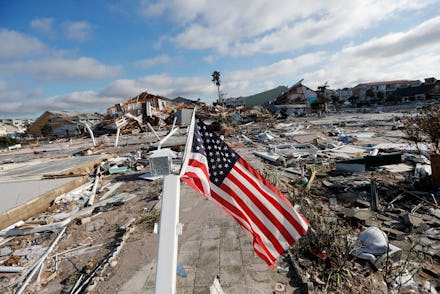How Hurricane Michael could scramble Florida’s tight midterm races

Hurricane Michael made landfall on the Florida Panhandle on Wednesday, wiping out coastal towns and wreaking immense damage further inland from the high winds, in what was just shy of a Category 5 storm.
As Floridians work to regain power and rebuild their homes and communities, the question has moved to how the storm might impact the state of play in the Sunshine State’s highly competitive and closely watched gubernatorial and Senate contests, which feature a Democratic rising star and term-limited governor making a political move.
A lot is on the line for two of the candidates: Tallahassee Mayor Andrew Gillum, the Democratic nominee for governor, and GOP Gov. Rick Scott, who is running for Senate. As the current governor, Scott runs disaster response in the state — and his performance could impact his standing among voters, both positive and negative. Meanwhile, Tallahassee was hard-hit by the storm. While much of the disaster relief plan for the region is out of Gillum’s hands, the exposure he’ll see in terms of storm response could impact his standing among voters.
“It becomes a question of how long the public remains satisfied with the recovery process,” Florida Democratic strategist Matthew Isbell said in an interview. “Long outages turn people angry fairly quick.”
The big political discussion has been around campaign advertising and fundraising in the midst of the storm, and now it has shifted to recovery and relief efforts.
It’s typically an unspoken rule that campaigns suspend attack ads against opponents during hurricanes and other natural disasters. But Rep. Ron DeSantis, the Republican nominee for governor, is continuing to air joint ads with the Florida Republican Party attacking Gillum.
While appearing on television to discuss storm preparation and response, Gillum has expressed dismay with DeSantis continuing to run the negative ads.
“My opponent has decided to leave all of his negative advertising up, all the way across the Panhandle, including right here where we are preparing our citizens for a Category 4 hurricane impact,” Gillum said Wednesday during an appearance on MSNBC. “Those news alerts are obviously on commercial break being intermittently interrupted by negative campaign ads that are untrue, and I think that’s unfortunate. We can’t recall a time where candidates for statewide office have not pulled down negative ads during hurricane season.”
Hunkered down in his Tallahassee home during the storm, Florida Democratic strategist Steve Schale wrote in a blog post stating that he believes DeSantis is leaving the ads up because he is behind in the polls and time is running out for his campaign.
“In a campaign, you can only control the things you can control,” Schale wrote. ”[Challengers can’t] control that their opponents are incumbents thrust into high-profile moments, in this case 27 days out, but they can control what their own campaigns do. I suspect that DeSantis’ decision to break convention and run negative ads in the markets impacted by the storm during the hurricane is mostly a function of the fact he’s trailed in every single poll taken since the primary, and the clock is starting to run out.”
The Florida Democratic Party is also criticizing DeSantis for reportedly still attending a campaign fundraiser on Thursday, one day after the hurricane hit.
“Ron DeSantis should immediately cancel his appearance with Tomi Lahren at the Alachua Republican Executive Committee,” Florida Democratic Party chair Terrie Rizzo said in a statement. “North Florida is still recovering from the devastation of Hurricane Michael, and it’s inappropriate for DeSantis to appear with Lahren, one of the most divisive and toxic commentators on Fox News.”
Gov. Scott is also trailing in the polls against his Democratic opponent, Sen. Bill Nelson. But a strong storm response could earn goodwill among voters and possibly boost his chances in November.
But despite the storm’s potential effects on voters and their opinions of the candidates, anything can happen with 25 days to go until voting.
“The reality is there’s no easy way to measure what all of this means,” Schale wrote in his blog post. “In a state like Florida where elections are decided in the margins, everything matters, and nothing matters. Rick Scott rebuilt his image through hurricane response, yet still trails Bill Nelson in many recent polls out there. Republicans have attacked Andrew Gillum on hurricanes, yet the mayor has led every single public poll since the primary.”